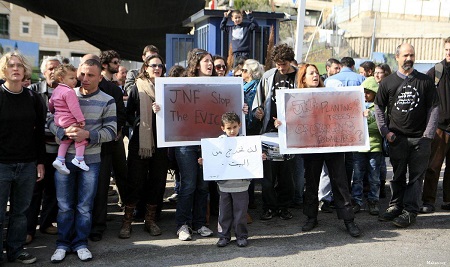The Israeli Supreme Court yesterday rejected a petition submitted by 104 Palestinians against claims by a right-wing Israeli organisation paving the way for 700 Palestinians to be forced from their homes, Haaretz reported.
The 700 Palestinians, who make up 70 families, have been going through a legal battle to protect their right to remain in their homes since 2002. Last June, lawyers for the occupation admitted that the process by which settlers organisation Ateret Cohanim received rights to the land was flawed. In spite of this, the judge ruled in favour of the settlers’ rights to siege the area.
Ateret Cohanim aims to take over Palestinian properties in occupied East Jerusalem and transfer then to Israeli settlers. The ownership claims were based on arguments of the properties’ situation before the establishment of the state of Israel in 1948.
Palestinian house deeds were transferred to the Benvenisti Trust by Israel’s Justice Ministry in 2002 claiming it purchased the land in the late 1800s to settle Jews arriving in Palestine from Yemen.
The court refused to rule on basis of land classification, saying that “the High Court isn’t the right venue for determining how the Ottomans classified the land”, Haaretz reported. Adding that the judges urged the occupation state to compensate anyone evicted.
According to UN OCHA, “Ateret Cohanim now controls a total of six buildings in the area, where 200 Israeli settlers live”. Palestinians of occupied East Jerusalem find themselves under no option but to go to Israeli occupation courts, where the case is treated as an ownership dispute between two equal parties.
Photo: Palestinians protest being evicted from their homes in Silwan on 25 November 2011. Source: Makan.org.














